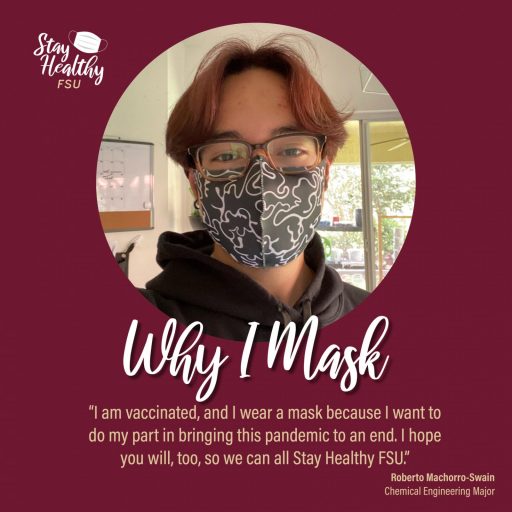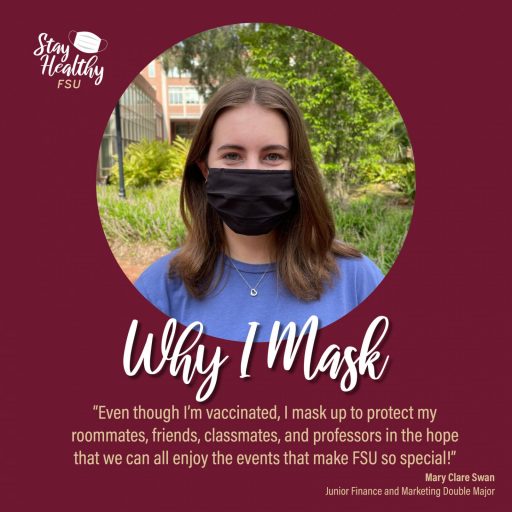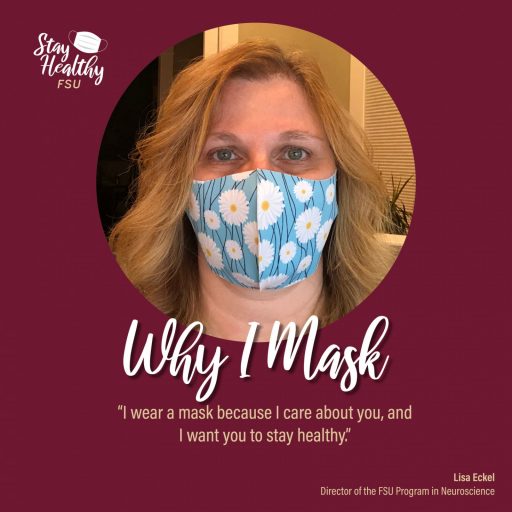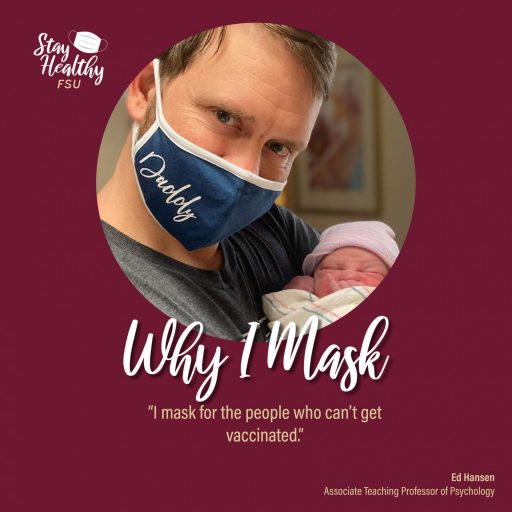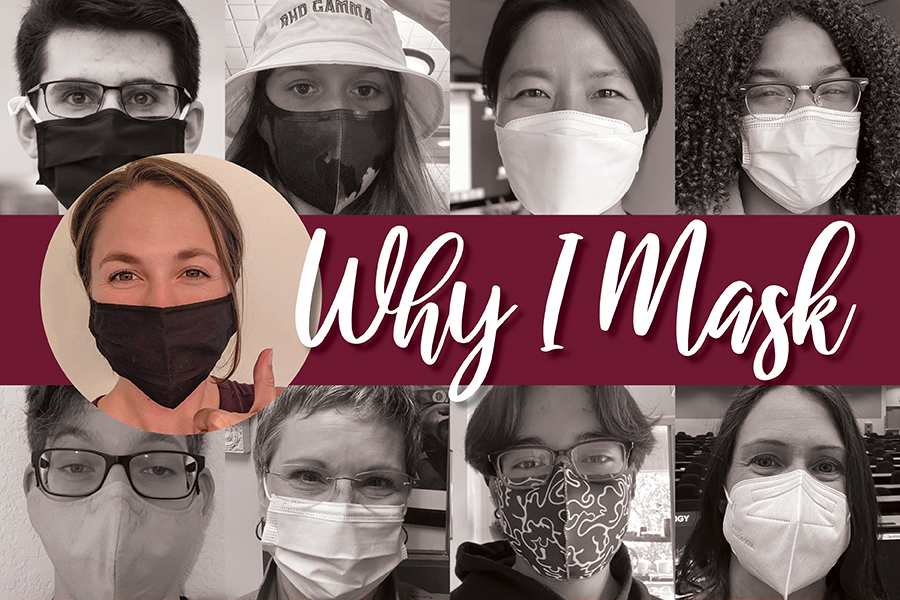
Faculty, staff and students at Florida State University are using social media to let the world know why they wear a mask — and hopefully prompt others to follow suit.
“Why I Mask FSU” began as a grassroots effort in the Department of Psychology, with faculty and graduate students creating posters conveying their personal reasons for masking and encouraging others to join in the effort to mitigate COVID-19 on campus.
The idea soon blossomed, via a partnership between the FSU College of Arts and Sciences and FSU University Communications, into a university-wide social media campaign that now dovetails with the university’s larger “Stay Healthy FSU” messaging effort and uses the hashtag #WhyIMaskFSU to invite the campus community into the conversation.
To date, the campaign has featured more than 25 individuals offering their reasons to mask up — and more are scheduled. The posts feature faculty, staff and students from across campus, including a host of departments within Arts and Sciences, the College of Medicine, the College of Communication and Information, the College of Business, and the FAMU-FSU College of Engineering.
The posts have been shared across FSU social media outlets including Instagram, Facebook, Twitter and LinkedIn and have been viewed more than 150,000 times.
“Why I Mask” was the idea of Assistant Professor of Psychology Adam Dewan, who brought it up during an unrelated meeting with some colleagues and Psychology Department Chair Frank Johnson.
“The conversation turned to COVID as it often does and it was clear there was a sense that we want to do something,” Johnson said. “So what do we do with that energy? At that point, Adam just jumped in.”
Dewan deflected praise for the idea but agreed with Johnson that there is a sense in the Department of Psychology — and among faculty across campus — of wanting to help.
As scientists, the psychology faculty understood the psychological value of modeling and personifying desired behaviors: Seeing people wearing masks and hearing their personal reasons for doing so help persuade others to adopt the practice. Not long after the initial idea, the Psychology faculty created the posters and tacked them up around the building.
“I think a lot of people want to do something and really don’t know what they can do,” Dewan said. “This isn’t a huge step. It’s a small step that can hopefully be a positive influence. There are so many more steps to go.”
The reasons for wearing a mask voiced through the campaign range from reducing the spread, returning to enjoying life free from a pandemic and the prospect of saving others, in particular those who are unable to be vaccinated.
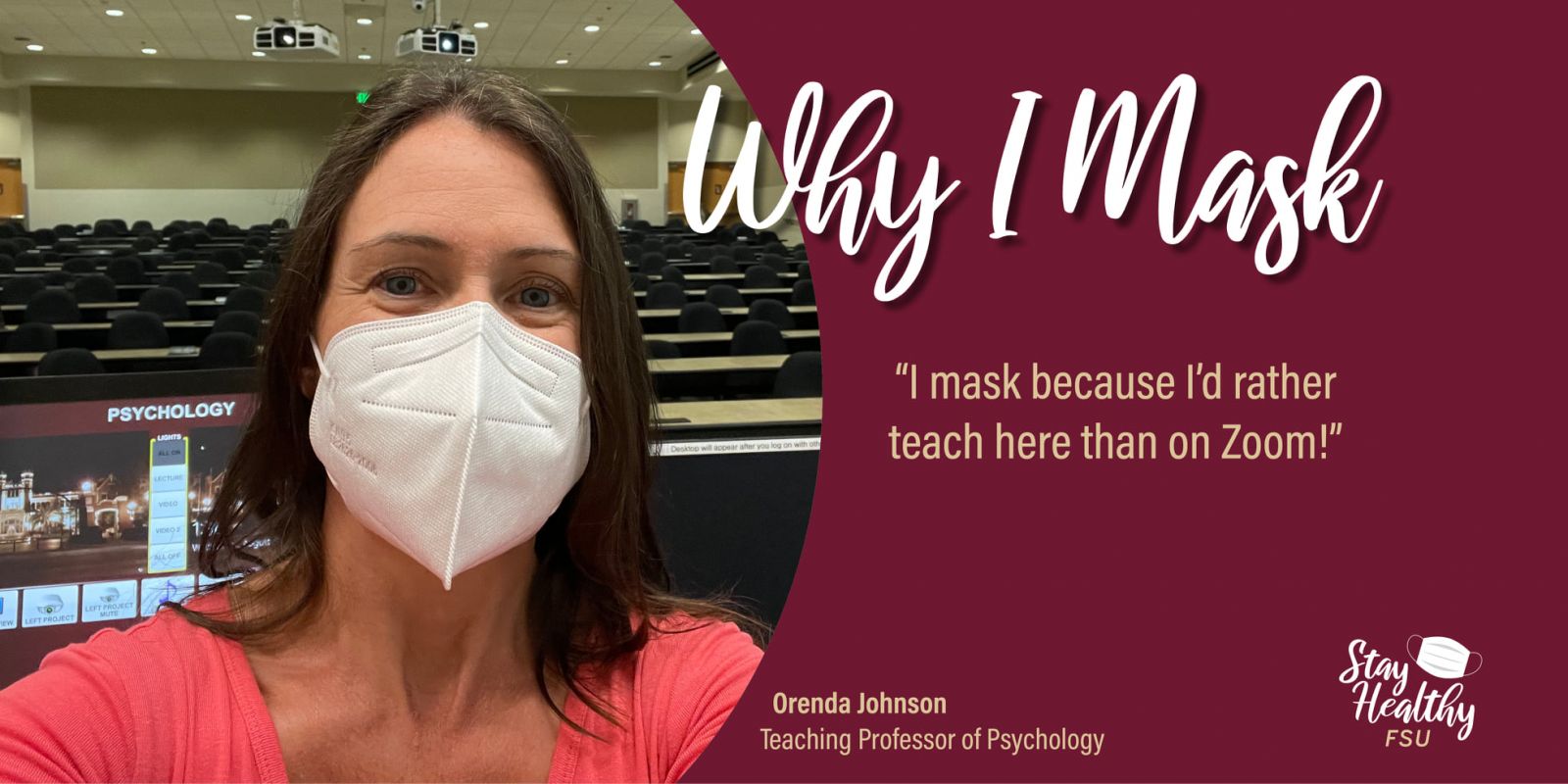
The Centers for Disease Control recommends wearing a mask to mitigate the spread of COVID-19, and FSU promotes the expectation that all students, faculty and staff members wear a mask on campus and when indoors.
One of the campaign posts features Ed Hansen, associate teaching professor of psychology, and reads: “I mask for people who can’t get vaccinated.”
Hansen’s picture features him holding his newborn baby and wearing a mask emblazoned with the word, “Daddy.”
Chemical engineering student Roberto Machorro-Swain said that he’s vaccinated and wears a mask “… because I want to do my part in bringing this pandemic to an end. I hope you will, too, so we can all Stay Healthy FSU.”
In her post, Professor Diana Williams said, “Although I’m vaccinated, I’m still masking to protect vulnerable people in our community.”
Williams noted that what happens at FSU echoes throughout the community and said she hopes that making masks a social norm can have a positive effect.
“Conveying to people that ‘this is what we do here, you are part of our program, part of our department, part of this group’ this is what do,’ can be effective,” she said.
Lisa Eckel, director of the program in neuroscience, addressed readers directly in her post, stating: “I wear a mask because I care about you, and I want you to stay healthy.”
Eckel said sending the message directly to whoever happened to be reading was a reflexive approach, but she hopes that perhaps it resonates on a personal level.
“We want everyone to wear a mask and to get vaccinated,” she said. “But it starts with an individual.”
Eckel said one example can make a difference.
“Anything that can model the behavior that we need to be seeing is going to be helpful,” she said. “Every person who gets vaccinated and every person who wears a mask makes this a safer place.”
Elizabeth Foster, assistant dean of Interdisciplinary Medical Sciences at the College of Medicine, said she masks up so students can safely have their own in-person, transformative experiences.
“College changed my life,” Foster wrote. “I want students to have a safe, in-person experience that might make a difference in their lives.”
Many of the stories received for the campaign have been incredibly moving, including a very personal one from Rossby Professor of Meteorology Emeritus Richard Pfeffer, who lost his wife to COVID-19. He reiterated the importance of wearing a mask for individuals of all ages.
“When I am in contact with groups of people, some wearing masks and others not, I have no way of knowing who has been vaccinated,” Pfeffer wrote. “Since vaccinated people can transmit the disease, I am at risk when I am near anyone who is not wearing a mask. And, of course, unvaccinated people pose an even greater danger to me.”
Ready to join the #WhyIMaskFSU campaign? Complete this brief Qualtrics survey.





